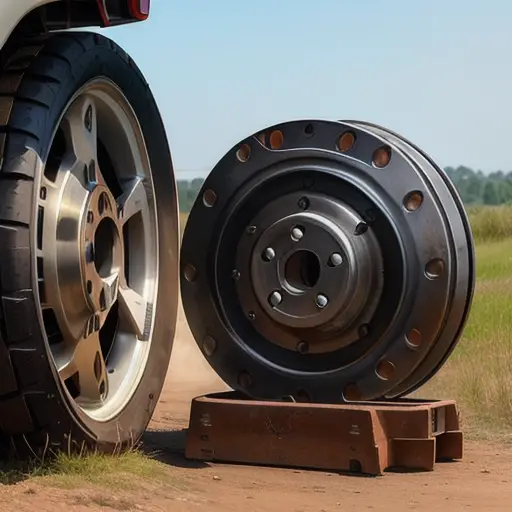How To Keep Brake Drums From Rusting? (Effective Prevention Methods)
Brake drums are an essential component of a vehicle’s braking system, and they are prone to rusting, which can cause noise, vibration, and even decreased stopping power. Rust on brake drums can be caused by exposure to moisture, salt, and other corrosive elements, and it can affect the performance and safety of a vehicle.
To prevent brake drums from rusting, it is important to take proper care of them. Regular maintenance, including cleaning and lubrication, can help prevent rust and prolong the life of the brake drums.
In this article, we will discuss some effective methods for keeping brake drums from rusting. We will cover both preventive measures and corrective actions that can be taken to address existing rust. With the right care and maintenance, you can keep your brake drums in good condition and ensure the safety and reliability of your vehicle’s braking system.
Painting – The Best Method Of Preventing Brake Drums From Rusting
While there are several methods of preventing brake drums from rusting, painting is one of the best and most effective. Painting brake drums can create a barrier between the metal and the elements that cause rust, preventing corrosion and extending the life of the brake drums.
Before painting brake drums, it is important to properly clean and prepare the surface. This involves removing any rust, dirt, or debris and sanding the surface to create a smooth, even finish. Once the surface is clean and dry, a primer can be applied to ensure good adhesion and further protect the metal from rust.
After the primer has dried, the brake drums can be painted with a high-quality, heat-resistant paint. This type of paint is designed to withstand the high temperatures generated by the braking system and will provide long-lasting protection against rust.
While painting brake drums can be a DIY project, it is important to take proper safety precautions and follow the manufacturer’s instructions carefully. If you are not comfortable with this process, it is best to have a professional do the job for you. With proper care and maintenance, painted brake drums can provide years of rust-free service and help ensure the safety and reliability of your vehicle’s braking system.
How To Remove Rust From Brake Drums?
can help prevent brake failure and prolong the life of your braking system. Here are some steps to remove rust from brake drums:
- Remove the brake drums from the vehicle: In order to properly remove rust from brake drums, they must be removed from the vehicle.
- Clean the brake drums: Using a wire brush or sandpaper, clean the surface of the brake drums to remove any loose rust or debris.
- Apply a rust dissolver: Apply a rust dissolver, such as Naval Jelly, to the surface of the brake drums. Allow it to sit for the recommended amount of time, as specified on the product label.
- Rinse and dry: After the rust dissolver has done its job, rinse the brake drums with water and dry them thoroughly with a clean towel or air compressor.
- Check for any damage: Once the brake drums are clean and dry, inspect them for any signs of damage or wear. If there are any cracks or other signs of damage, the brake drums should be replaced.
- Reinstall the brake drums: Once the brake drums are clean and inspected, reinstall them back onto the vehicle.
Should I Add Clear Coat?
While adding a clear coat to brake drums may seem like a good idea to protect against rust, it is not recommended. Clear coat is not designed to withstand the high temperatures that brake drums can reach, which can lead to discoloration, peeling, and other damage.
Additionally, brake drums require a specific type of paint that is heat-resistant and designed for use on metal. If you apply a clear coat on top of this type of paint, it can interfere with the paint’s ability to properly adhere to the brake drum surface, which can lead to premature chipping, cracking, or peeling.
Instead of adding a clear coat, it is important to use the appropriate paint designed for use on brake drums, and follow proper maintenance procedures to prevent rust from forming. This includes regularly cleaning the brake drums, inspecting them for signs of wear or damage, and addressing any issues promptly.
Should I Replace Rusty Brake Drums?
If your brake drums are rusted and have significant wear, it is recommended to replace them rather than attempting to repair them. Rusted brake drums can compromise the effectiveness of your braking system, which can be dangerous and increase the risk of accidents.
When brake drums become excessively rusted, they can develop pits and grooves that can cause the brake pads to wear down unevenly, leading to poor braking performance and potential brake failure. Additionally, the rust can cause the brake drums to become warped, which can lead to vibration and noise while driving.
If you notice any signs of rust on your brake drums, it is important to have them inspected by a professional mechanic as soon as possible. They can advise you on whether the brake drums can be resurfaced or if replacement is necessary for optimal brake performance and safety.
How Effective Are Rust Converters?
Rust converters are a type of product that is used to convert rust into a stable, non-rusting surface. They work by reacting with the rust and forming a layer of protective coating on the metal surface.
Rust converters can be effective in stopping the spread of rust and preventing further damage to the metal surface. However, it is important to note that they are not a permanent solution to rust and may not work for all types of rusted surfaces.
Additionally, rust converters should only be used on surfaces that are free of grease, oil, and loose rust. The surface should also be cleaned and dried before applying the converter for optimal results.
It is important to follow the instructions provided by the manufacturer when using rust converters to ensure safe and effective use. It is also recommended to consult a professional mechanic before using rust converters on critical parts of your vehicle, such as brake drums, to ensure they will not compromise safety or performance.
How Long Does It Take For Paint To Cure On Brake Drums?
The time it takes for paint to cure on brake drums can vary depending on the type of paint used and the conditions under which it was applied. Generally, it is recommended to wait at least 24 hours before driving the vehicle to allow the paint to fully cure.
The curing time for most types of automotive paint is around 24-48 hours at room temperature, but it can take longer in cold or humid conditions. It is important to check the manufacturer’s instructions for the specific paint product you are using to determine the recommended curing time.
It is important to avoid driving the vehicle or exposing the painted brake drums to moisture or extreme temperatures during the curing process. This can cause the paint to dry unevenly or become damaged, compromising the appearance and protection of the painted surface.
Once the paint is fully cured, it should provide a durable and protective coating that helps to prevent rust and corrosion on the brake drums.
Other Ways To Prevent Brakes From Rusting?
In addition to painting, there are several other ways to prevent brake drums from rusting:
Regular use: Brake drums are less likely to rust if they are used frequently. When the brakes are applied, the friction generates heat that helps to keep the surface of the drums dry and prevent rust from forming.
Keep them dry: If you live in a damp or humid environment, try to keep your vehicle parked in a dry location or use a car cover. This will help to prevent moisture from accumulating on the brake drums and causing rust.
Use rust inhibitors: There are several rust inhibitors available that can be sprayed on the surface of the brake drums to prevent rust from forming. These products typically contain chemicals that help to neutralize the corrosion process and create a barrier that protects the metal from moisture and oxygen.
Lubricate moving parts: Lubricating the moving parts of the brake system can help to prevent rust from forming on the surface of the drums. This is because the lubricant helps to displace moisture and prevent it from accumulating on the metal surface.
Is Rust On Brake Drums Unavoidable?
Rust on brake drums is not completely unavoidable, but it is a natural process that occurs over time due to exposure to moisture and oxygen. While rust can be unsightly and potentially harmful to the braking system if left unchecked, there are several ways to prevent it from forming or slowing down the process. Regular maintenance, such as cleaning and lubricating the brake system, can help to reduce the likelihood of rust formation.
Additionally, using rust inhibitors, painting, and storing the vehicle in a dry location can help to protect the brake drums from rust. It’s important to note that rust may still occur despite taking these measures, especially if the brake drums are exposed to harsh environmental conditions or used infrequently. Regular inspections and maintenance of the brake system can help to identify and address rust issues before they become severe and potentially dangerous.
Can I Use Vinegar To Remove Rust?
Yes, vinegar is a popular and effective home remedy for removing rust from metal surfaces, including brake drums. The acetic acid in vinegar reacts with the rust and breaks it down, making it easier to remove. To use vinegar for rust removal, soak a clean cloth in vinegar and wrap it around the rusted brake drum.
Leave the cloth in place for several hours, or overnight if possible. Afterward, remove the cloth and scrub the rusted area with a wire brush or sandpaper until the rust is removed. Rinse the brake drum thoroughly with water and dry it with a clean cloth.
While vinegar can be effective for removing rust, it’s important to note that it may not be as effective as commercial rust removers or professional cleaning methods, especially for severe or stubborn rust. It’s also important to take proper safety precautions when working with vinegar, such as wearing gloves and eye protection, and working in a well-ventilated area.





